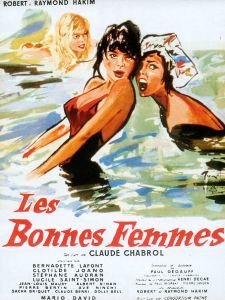
Having encountered early Chabrol once before, in ostensibly the first Nouvelle Vague film, Le Beau Serge, I thought I knew what to expect from Les Bonnes Femmes. I was wrong- in fact, I was surprised by the power and shock of it- an unsettling force that grows in unusual ways through gut-wrenching tonal shifts, and lingers in the viewer's memory. The bulk of the film treads the pleasurable, good times terrain of some early New Wave films (A Woman is a Woman, Brigitte et Brigitte), or in its anarchic jaded shopgirl feel, Chytilova's Daisies. Yet bookending this episodic play of love and work are two acts of patriarchal violence- an alluded rape, and an unambiguous murder at the hands of a stalker. The rape troubles the middle portion of the film, but without souring its comedic delight. With one of the women's murder, however, the entire narrative is thrown into confusion retrospectively, playing out with the impact of a fist in the stomach (not unlike the horrible attack that closes Breillat's Fat Girl.) A doe-eyed innocent murdered, and the fates of the other 3 protagonists abandoned, Chabrol segues to a dreamy coda that clarifies theme while furthering tonal confusion. An unknown woman sits alone in a dance hall, her face in shadows, under the narcotic trance of a mirrored ball and band. A man approaches, seen only from behind, and takes her onto the dance floor, fulfilling her only social role- to be brought into the world, made whole, through the predatory desires of the male. Is this a proto-feminist film?

The first 15 minutes of Les Bonnes Femmes are perhaps its best, tightly composed and edited, and bristling with a pervasive city lights energy not unlike the opening sequence of Touch of Evil. Men purposefully wait under the neon lights of an emptying theater; a group of women emerge, one bids goodbye to her boyfriend; the two men get into a car and follow them; simultaneously, a motorcyclist tails them all. Is this a Hitchcockian suspense? Intrigue set in motion? Surprisingly, neither, but rather a pair of crude philanderers cruising for girls, the mysterious cyclist falling away from the scene, to turn up later in a seemingly less menacing role. It is a confusing and suspicious sequence for the audience, that raises one's guard, but not enough to alienate us from the gaudy pleasures of the nightclub, zoo, theater, and swimming pool to come. Chabrol spends the next hour charming us with these 4 likable working girls who share employment at a perpetually dead electronics store, before our suspicions are vindicated. All 3 men in the opening sequence will come to be revealed as villains- rapists, murderers, bullies, sadists, and liars.
This is not to say that the time we spend with Jacqueline, Jane, Ginette, and Rita is padding or extraneous to the darker themes the film leaves us with. On the contrary, it is entertaining and thought provoking enough in turn that the shock of Jacqueline's murder would be meaningless if it did not jolt us out of something so engrossing. Prefacing, in a sense, their victimization, is Chabrol's sympathetic portrait of working class life for young women- the boring, long hours of standing around and looking pretty in shops, the sexual harassment from bosses and delivery boys, immersion in the world of luxury- but luxury only attainable by pawning their bodies to men. The looming presence of clock faces suggests a collusion of capitalism and patriarchy, beyond which, heroically, the young can still dance along in search of love and happiness. Indeed the "fun and games," acted with spirit (especially by Bernadette Lafont as Jane) is what distinguishes Les Bonnes Femmes from other capitalism-as-prostitution films of the same time like Godard's Vivre Sa Vie; without the juxtaposition of comedy/tragedy, joviality/violence its main point of interest is lost. Our heroines tramping through the zoo, for instance, is on par with the best antics of Jules and Jim, Karina and Leaud. And it should not be thought, based on the bleak ending, that Chabrol is a cynic in matters of love. Starry-eyed romance may lead to Jacqueline's downfall, but she is hardly to be faulted for her desires; nor Jane for her free-spirited flings, Ginette her chanteuse ambitions, and Rita her engagement with a neurotic square.

Returning to the question of Les Bonnes Femmes as a feminist, or proto-feminist film; it's a tricky question without clear criteria (and also grappling with by what degrees this is determined by content, production, etc.), but there is a critique in the film of the ugly forms of violence and exploitation to which women are subjected. Men are brutal predators, whose veneer of charm eventually gives way to naked aggression. Those men that defy this description are given a small sliver of screen time (Jane's beau), or are controlling in other ways (Rita's fiancee.) Beyond this, a feminist critique becomes more dubious, tempered as it is by the obvious male pleasures of watching beautiful young women carry on in tight dresses and bathing suits. Chabrol's construction ducks in and out of ideas like a game, dropping characters unceremoniously, coaxing emotional investment to have it turned into stone, and making us witness to the murder of a naif before dumping us into a starlit dance hall dream. Its a bold way of making a film, and raises my estimation of the guy (although from what I read his subsequent work loses a sense of experimentation and play.)
